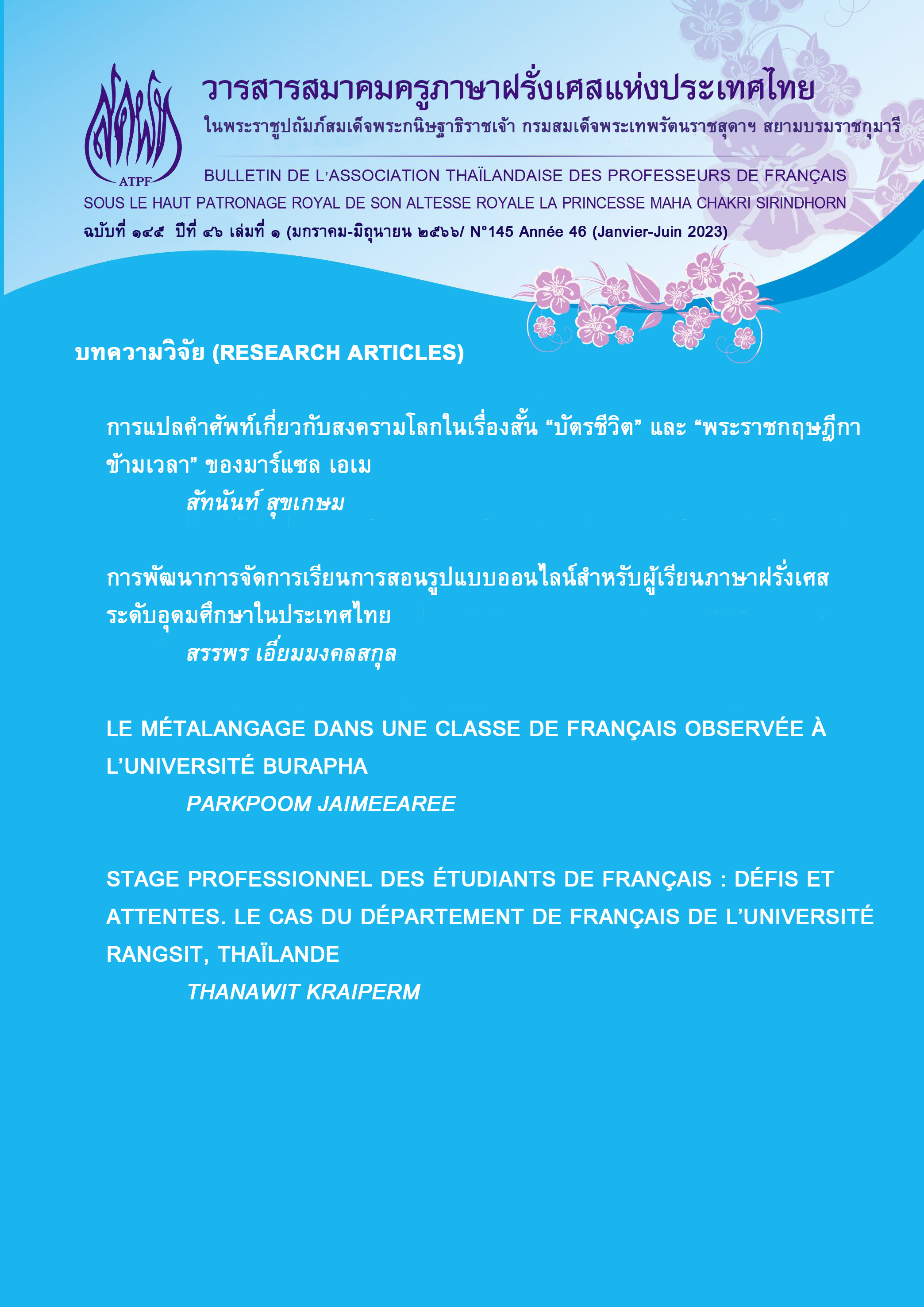Le métalangage dans une classe de français observée à l’Université Burapha
Main Article Content
บทคัดย่อ
Le métalangage est un phénomène dit ordinaire dans les interactions didactiques entre enseignant et apprenants dans une classe des langues étrangères. Il est omniprésent dans une situation d’enseignement/apprentissage d’une langue étrangère : une partie importante des pratiques discursives de l’enseignant est consacrée à l’explication du sens d’un mot recherché. C’est pour cette raison que ce travail de recherche vise à distinguer des opérations métalinguistiques essentielles que l’enseignant effectue dans une classe de français observée à l’Université Burapha. Nous pouvons distinguer quatre opérations métalinguistiques qui sont dénommer, définir, paraphraser et se référer à une situation virtuelle. Ces quatre opérations métalinguistiques permettent à des apprenants en difficulté lexicale de trouver le sens d’un mot inconnu sans avoir recours à la langue maternelle.
Les données que nous avons menées ne se focalisent que sur une classe de français observée à l’Université Burapha. Cette focalisation ne nous a pas permis de généraliser les résultats de l’analyse au niveau national. L’observation d’une classe de français est pour nous un exemple d’espace clos qui demande à être poursuivi par l’élargissement du choix des contextes, ce qui pourrait nourrir les données de base contribuant à une analyse plus approfondie.
Malgré cela, nous espérons que ce travail de recherche constituera une vue d’ensemble des opérations métalinguistiques ayant pour but de permettre aux apprenants d’accéder au sens d’un mot recherché et de contribuer à améliorer la situation didactique en Thaïlande.
Downloads
Article Details
เอกสารอ้างอิง
Besse, H. (1975). Pratique de la classe audio-visuelle au niveau 1. Paris : Didier/Crédif.
Borillo, A. (1985). « Discours ou métadiscours ? » in Revue de Linguistique 32. Paris : Centre de recherche de L’Université de Paris VIII – Vincennes, pp.47-61.
Cicurel, F. (1985). Parole sur Parole ou le métalangage dans la classe de langue. Paris : Clé International.
Cicurel, F. (1999). « Littérature, fiction, apprentissage : le monde fictionnel du discours » in Étude de linguistique Appliquée 115. Paris : Didier, pp.291-304.
Dubois, J. et al. (2001). Dictionnaire de Linguistique. Paris : Larousse.
Fuchs, C. (1982). « La paraphrase entre la langue et le discours » in Langue française 53, pp.22-33.
Galisson, R. (1979). « Compétence communicative et acquisition des vocabulaires » in Travaux de didactique du français langue étrangère, Numéro 3, Montpellier : Université Paul-Valéry, pp.1-33.
Ishikawa, F. (2001). L’interaction exolingue : analyse de phénomènes métalinguistiques : continuité et discontinuité entre situation d’enseignement/apprentissage et situation naturelle. Paris : Université de Paris III – Sorbonne nouvelle.
Masset-Martin, A. (2020). Hétérogénéité des pratiques et du lexique métalinguistiques en classe de FLE/S, from https://doi.org/10.4000/corela.11653.
Rey-Debove, J. (1978). Le métalangage : étude du discours sur le langage. Paris : Armand Colin.
Rey-Debove, J. et Rey, A. (2000). Le Petit Robert. Paris : Dictionnaire Le Robert.
Vion, R. (1992). La communication verbale, analyse des interactions. Paris : Hachette.


